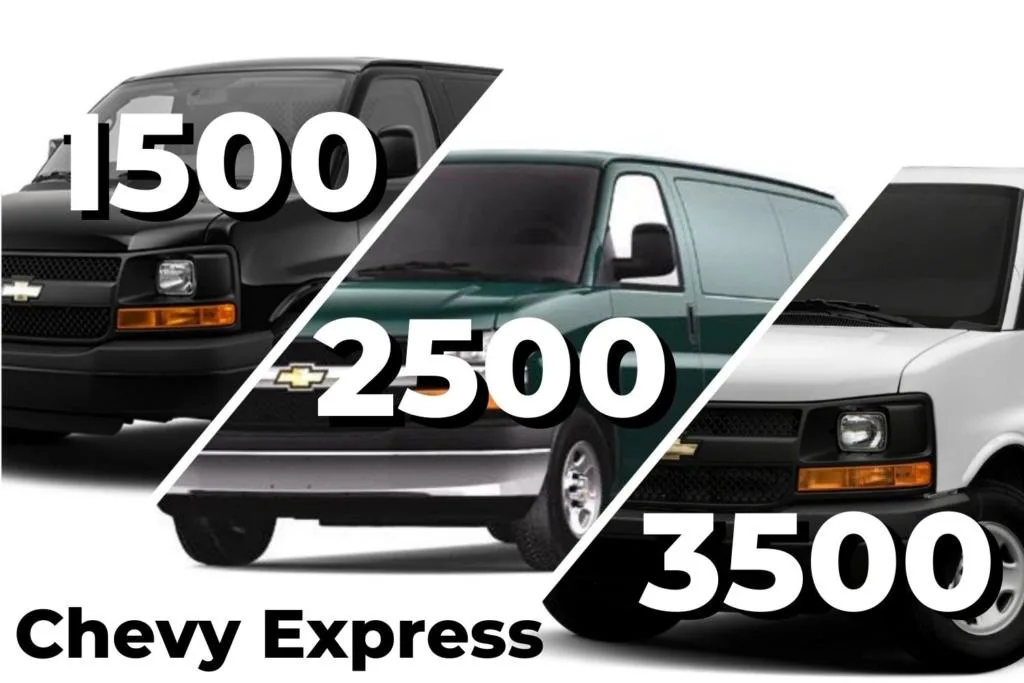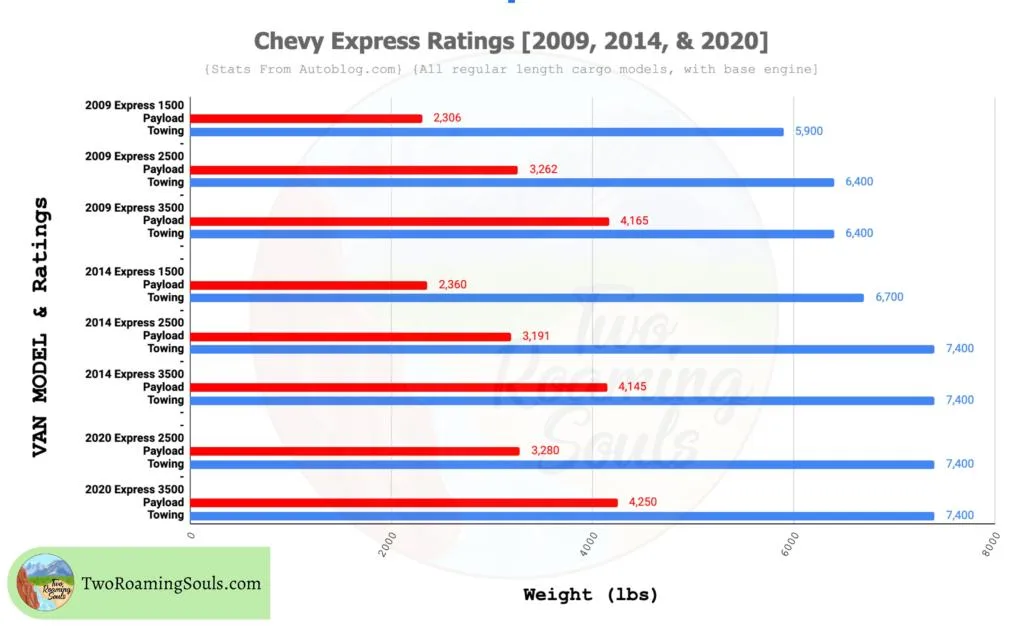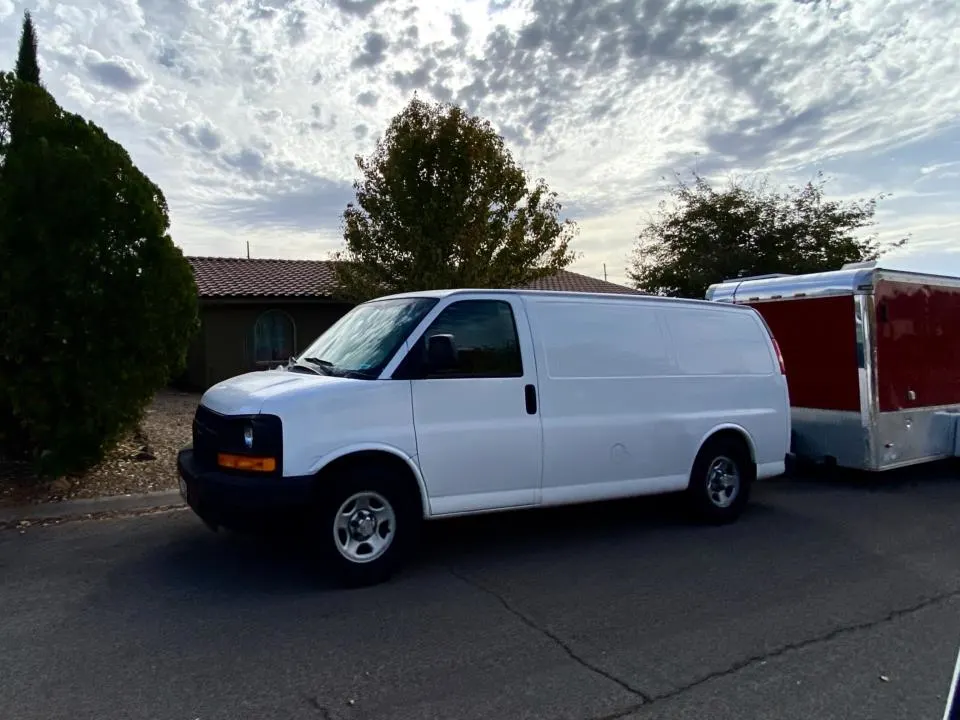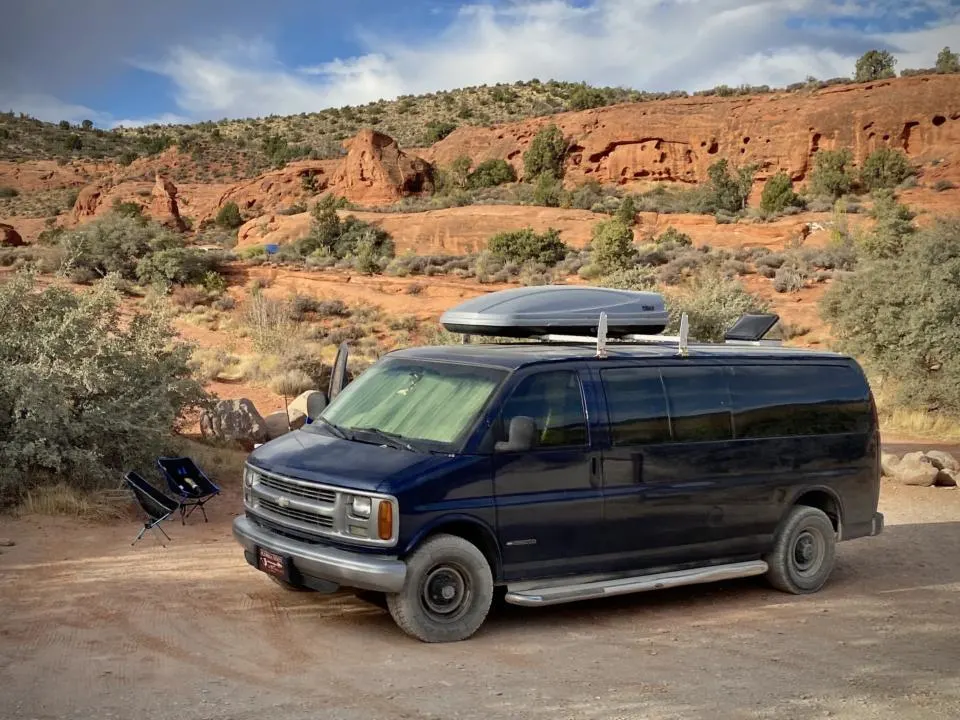Are you curious what the difference is between the various types of Chevrolet Express Vans? What exactly is the difference between Chevy 1500, 2500, and 3500? And note that the GMC Savana van is mechanically identical to the Chevy Express. They are both made by General Motors, so everything I mention in this post applies to both lines of vehicles. I will explain the difference between these common Chevy and GMC Vans, and why you might choose one over another.

(And if you are curious, the other American vans have a similar relationship. So you can roughly apply the same explanation to Ford E-series vans and Dodge Ram Vans 1500, 2500, 3500)
The Basic Difference
In easy to understand terms, the higher the number, the more heavy-duty the van is and the more weight it can haul. And it means the vans are built with different parts to accommodate more weight (i.e. bigger engines, more robust suspension/brakes/ and other parts).
History
The Chevy Express and GMC Savana are General Motors’ full-size vans that have been in production since 1995. They replaced the Chevrolet Van and GMC Vandura which were based on a unibody design. But beginning with the Express and Savana, they switched to a body-on-frame design that’s borrowed from their trucks.
So if you’re familiar with Chevy Trucks, the Chevy Express vans have a similar relationship as the Chevy 1500, 2500, and 3500 Trucks.
2014 was the last year of production for the “light-duty” Express 1500 and Savana 1500.
And General Motors made some All-Wheel-Drive models of the Express 1500 and Savana 1500. But after the discontinuation of the 1500’s, AWD is no longer available.
Terms To Know
Curb Weight – How much a vehicle weighs without passengers or cargo.
GVWR – Stands for Gross Vehicle Weight Rating, and it’s the maximum weight that a vehicle can reach including passengers, cargo, gasoline, fluids.
Payload – How much weight in cargo and/or passengers a vehicle can carry. You subtract GVWR – Curb Weight = Payload.
What Does The Number Signify?
The number in the name of each van (Chevy Express 1500, 2500, 3500) indicates their increasing payload (how much weight it can haul).
There are two main classifications that help group similar vehicles.
The first is how the government classifies vehicles (for fuel efficiency). They classify Light-Duty as any vehicle with up to 8500lbs GVWR or up to 4000lbs payload. The Chevy Express 2500 and 3500 are both considered heavy-duty vehicles because they have a GVWR over 8500lbs. The Express 1500 is under that threshold, so it’s considered light-duty.
The second common shorthand way to classify vans is by referring to their payload in terms of tons {one ton = 2000lbs}. So the 1500 is ½ ton, 2500 is a ¾ ton, and 3500 is a one ton. But this system is wildly outdated because the payload ratings have soared past those definitions. For example, the “one ton” 2020 Chevy Express 3500 has a payload of 4,250lbs, which is literally over two tons! And yet, people still use these antiquated terms.
How Are They Built Differently?
In order to haul more weight, each increasing van has certain parts upgraded to accommodate a higher payload. So the 2500’s and 3500’s are built with more robust suspension, brakes, etc. They may also have larger engines, better transmissions, and higher output alternator.
Payload Comparison | Chevy Express Vans
It’s important to choose a van with an appropriate payload rating for your intended use. As I mentioned, the payload ratings from lowest to highest are 1500, 2500 and then 3500. And generally payloads and towing capacity increase over time as the technology improves. However, the change is very gradual as these vans were mostly treated as “if it ain’t broke, don’t fix it”.
But something to note is that the All-Wheel-Drive (AWD) Express 1500 models are on average about 300lbs heavier, which means about 300lbs less payload.

Towing Capacity | Chevy Express Vans

The Express 1500’s have the lowest towing capacity. And the 2500 and 3500 are on top and have generally been rated to have the same towing capacity.
Length & Wheelbase
The regular length Express vans have a 135” wheelbase. And the Extended models have a 155” wheelbase, and offer an increase in cargo space from 239 cu. ft. to 284 cu. ft. [source: Autoblog.com]
Cargo vs Passenger (Wagon)
You will see the Chevy Express 1500, 2500, 3500 offered in cargo or wagon models. Basically, the cargo vans are work vans that are just an empty metal shell in the back. The wagon models (aka passenger) are meant for carrying people. They will have seats, a finished interior, and possibly rear climate control, lights, charge ports, etc.
What Does LT and LS Stand For?
The LT and LS titles stand for the different trim offerings. They are generally reserved for the passenger (wagon) models because they include extra features that make the van more comfortable for passengers. It can include carpeted floors, rear air-conditioning, satellite radio, nicer upholstery, chrome bumpers, and more.
That’s pretty much the end of the easily quantifiable differences between Chevy Express 1500, 2500, and 3500. But smart buyers will still wonder how these different models compare in categories with larger variance, such as Fuel Economy, Cost of Ownership, and Longevity.
I’ve spent hours researching the more nuanced differences between Express and Savana vans. The problem is that finding concrete evidence to support claims is difficult because the real-world doesn’t function like some perfectly controlled science experiment. And manufacturers are even exempt from reporting many statistics for heavy-duty vehicles.
- The manufacturers and dealers claims are sometimes frustratingly not consistent with the real-world numbers.
- Or you can turn to automotive websites {like Edmunds.com, Autoblog.com, etc} who either regurgitate the manufacturers claims, or try (and possibly fail) to make predictions about real-world MPG, Cost of Ownership, etc.
- And lastly, you have just regular people on forums and blogs providing their own anecdotal “evidence” to support their claims. And obviously that method is subject to error.
So I’ve done my best to summarize the things that are generally accepted as true. That is, multiple sources confirm roughly the same information.
But one huge piece of advice that I hear echoed over and over from fleet owners and mechanics is this:
How you treat your van is much more important than which one you have. Any marginal difference in fuel economy, repair costs, and longevity can be obliterated by poor ownership.
Fuel Economy
The fuel economy generally gets worse with each increasing model. But the variance is only a few MPG.
And this of course depends on how you use the van. Because an overloaded Express 1500 will get worse MPG than an Express 3500 working comfortably within it’s GVWR.
Ride Comfort
The fact that these vans are tuned for specific payloads, means that they ride smoother when loaded properly. So an empty Express 3500 is going to be a really rough ride. Conversely, an overloaded Express 1500 will also be rough, because the suspension is bottoming out.
Repairs and Maintenance
The repairs and maintenance will on average cost more for each increasing model.
Longevity
A WELL-MAINTAINED Chevy Express van should last until 250-300k miles on the original engine. And the transmission usually bites the dust around 120-200k miles.
As far as the difference between 1500, 2500 and 3500, I’ve only seen anecdotal claims that the 2500’s and 3500’s vans last longer. But it’s hard to find concrete evidence of this in the real world. And it may be that Express 1500 owners are just overloading their vans, so they don’t last as long.
Conclusion | Difference Between Chevy Express 1500, 2500, 3500 Vans

The primary factor when choosing from the Chevy Express and GMC Savana lineup is Payload and Towing, since that is the main quantifiable difference. At the end of the day, you need a van capable of handling the weight you need to move. But equally important is finding a van that’s in good mechanical shape.
In the context of campervan conversions, the weight of your conversion materials will dictate the payload required. This will depend on what type of conversion you’re planning. A general rule of thumb is that 2500 and 3500 are best for elaborate conversions with wooden furniture, water tanks, batteries, and all your belongings. The Express 1500 is better suited for builds with lightweight materials (plastic, foam, aluminium) or “weekend-warrior” type conversions that aren’t loaded with so many personal belongings.
Unless you’re towing something like a large boat or camper trailer, then any Express van will do the job. But if you are towing heavy loads then you may want to consider an Express 2500 or Express 3500.
If you must have an Extended van, then you are limited to the Express 2500 and Express 3500.

Read My Other Post: How To Choose a Van for a Campervan Converison.

How To Choose A Van For A Campervan Conversion - tworoamingsouls
Wednesday 5th of April 2023
[…] guide to Ford E-Series Vans). And most other full-size vans have a similar system (i.e. Chevy Express 1500, 2500, & 3500). And as a side note, the more heavy-duty vans tend to last longer with heavier loads and […]
All Vans With 4x4 or AWD (in the US) - tworoamingsouls
Sunday 19th of March 2023
[…] the only full-size van in the US with AWD. The AWD was only available on 1500 regular length Chevy Express Models (i.e. no 2500, 3500, or extended […]
How Much Water Does A Campervan Need For Vanlife - tworoamingsouls
Monday 7th of March 2022
[…] What’s the difference between Chevy 1500, 2500, and 3500? […]
Van Towing Ratings | How Much Can A Campervan Tow? - tworoamingsouls
Monday 7th of March 2022
[…] What’s the difference between Chevy 1500, 2500, and 3500? […]